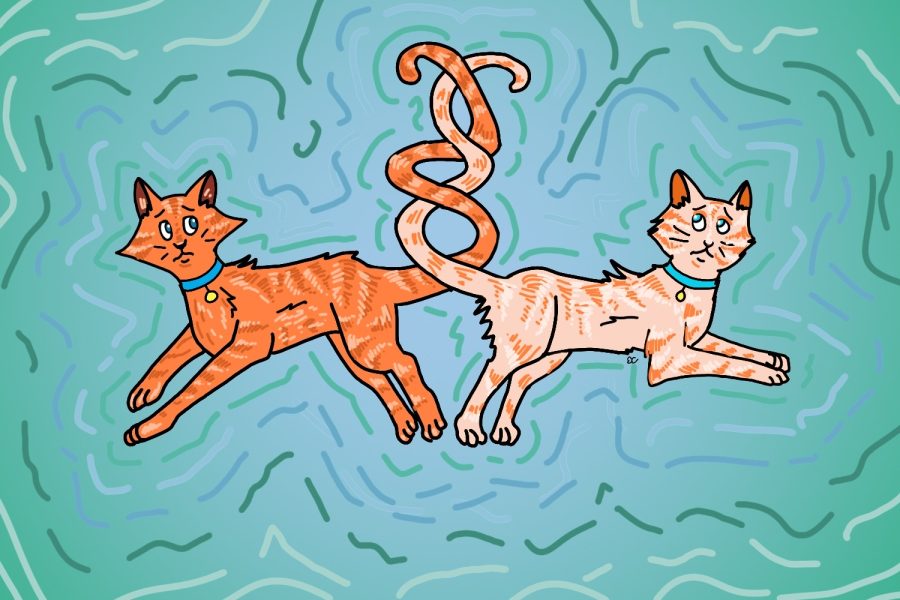Don’t be afraid to distance yourself from codependent relationships
February 20, 2023
I have always struggled to make friends because of my social anxiety, so in eighth grade, when I switched to a new school, I was extremely worried about meeting new people.
To my surprise, I quickly became close with another new student.
We would do everything together, hanging out everyday after school and essentially living at her house on the weekends. While at surface level, it seemed this was the perfect friendship, we both grew to be codependent.
Codependency is when two people in a romantic or platonic relationship rely on each other mentally, emotionally or even physically, according to a Nov. 7, 2022 article by Verywell Mind.
Lots of people want to feel like they are the most important person to someone, as if significance to someone else gives their own life more meaning. However, this mindset can quickly become toxic.
I began to notice that my newfound friend relied on me for almost everything. It made it impossible to maintain other relationships in my life. It felt like I was betraying our friendship if I even spoke to another person our age.
I am a very passive and non-confrontational person, so this middle school friendship was not the last time I found myself trapped by codependency.
I soon realized most of the closest people in my life had more dominant or aggressive personalities.
Another time I found myself shackled by codependency was my junior year of high school, when I very quickly became close to a senior girl.
At first, I was just happy that someone in the grade above even talked to me, but I think she saw my eagerness to please her and took advantage of it.
Looking back, our friendship always felt really one-sided. I was constantly giving her validation and we would only ever talk about all of her problems.
In fact, she knew I had severe anxiety, and whenever she saw me have an anxiety attack, she would ignore me or walk away.
I was scared to disagree with her because it would cause her to get mad or raise her voice at me, so I found myself constantly biting my tongue and not sharing my opinions.
Feeling like you have to walk on eggshells around someone and make excuses for their behavior, or that you need to constantly apologize, are signs you may be in a codependent relationship, according to the Verywell Mind article.
Being fully immersed in someone else’s emotions and problems left me with no room for my own. I felt as though my entire identity had vanished and my only purpose was to take care of the other person.
It’s completely normal to share struggles and emotional difficulties with friends, but when it starts to affect ones mental health, it begins to cross a line.
You cannot depend on one person to help you carry all your emotional baggage—it’s too much pressure, especially when they already have their own problems to deal with.
Within a codependent relationship, there is always the “helper” and the “helped,” according to a March 12, 2014 Symmetry Counseling article.
However, the blame should not all fall upon solely on the helped. Oftentimes, the helper feels a sense of importance or like they are a savior. But by allowing the other party to continue self-destructive behavior and refusing to set boundaries, the helper’s people-pleasing tendencies are only hurting everyone involved.
I never should have indulged such harmful behaviors for so long. But, like any big problem, it started off much smaller. It started with being asked to skip a party because she had a fight with her mom, and with listening to her speaking badly about others so I wouldn’t want to be friends with them.
Falling into these roles contributes to the loss of identity. One’s sense of self is a crucial component to human existence. Without some level of individualism, we can not engage with our own perspectives.
These relationships eliminate the possibility for growth, but there are steps that can be taken to heal or mend relationships that you do not want to disregard forever.
The most important things one can do is be honest, try not to take things personally, create better boundaries or even take a break from the other person, according to a Sep. 19, 2016 article by Willingway.
Unfortunately, with these relationships I’ve had to take a clean break. My friend from eleventh grade and I no longer speak due to an argument that started because I finally disagreed with her.
Continuing a relationship based on mutual obligation or attachment is not healthy for anyone involved and only reinforces dangerous habits. Still, one should ideally aim to have mature conversation when it comes down to advocating for a change.
Maybe if I shared how bad my former friend’s behavior made me feel sooner, or if I had done it in a more delicate way, we could at least be on better terms. In these types of situations, it’s better to confront much sooner and more calmly before things blow up.
Some relationships just aren’t meant to work out because two people can enable or bring out the worst qualities in one another. It doesn’t make either party “bad,” but at one point or another, someone must make a change.
It is never OK for a person to constantly project all of their emotions or challenges onto someone else, but it’s also unjust for that person to allow the other to treat them as an emotional ATM.
The suffocating reality of codependency can be a lot to digest but not impossible to overcome. It’s never too late to reexamine or heal relationships.
